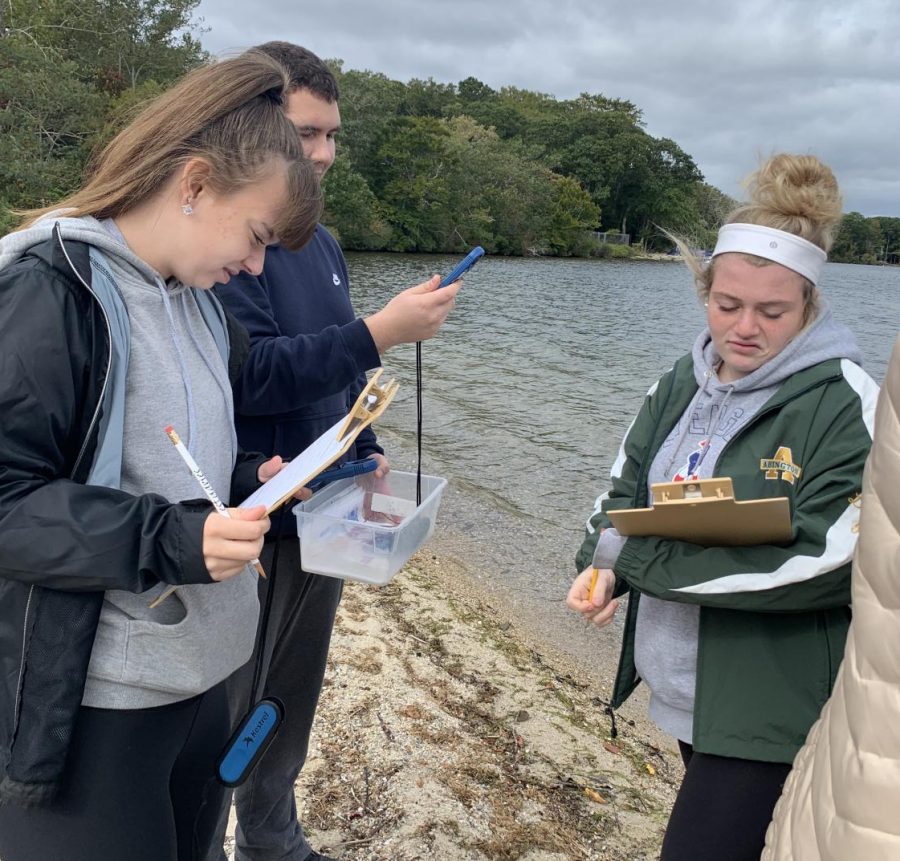Water Crisis in Waquoit Bay
AHS Students Learned about Environmental Issues
There is a major problem with water pollution down the Cape. On October 3, 2019, Abington High School’s Environmental Science class went on a field trip to Mashpee to visit Waquoit Bay. Nancy Church, Education Coordinator for Waquoit Bay, along with an AmeriCorps volunteer who introduced himself as Andrew, guided us around four places on this field trip: Waquoit Bay, Mashpee Pond, the Herring Run at the Wampanoag Museum, and Popponesset Bay.
Leading the high school field trip to Mashpee was science teacher Ms. Nicole Corbett. She chose to take her students on this trip because “water quality and pollution issues have been among the state’s top environmental problems over the past few years.”
Ms. Corbett said, “I have been the head of a water quality testing project in Popponesset over the past few months and thought that my work in the area along with the expertise provided by Waquoit Bay scientists and educators could offer students a unique insight into water pollution on the Cape.”
The water issues down the Cape are not only there. Corbett said that “for the last two years, stories about water quality degradation and algal blooms have made national news.” There have also been algae problems in Abington such as at Ames Nowell State Park. Blue green algae has killed or harmed animals like dogs.
Students on the field trip learned that one of the main problems that impacts the water in Waquoit Bay are the septic tanks under most of the houses in that area. These septic tanks leak lots of nitrogen into the water causing rapid algae growth. The rapid growth of algae blocks the sunlight from different marine plants and animals like eel-grass and shellfish, causing them to die. These septic tanks are supposed to be replaced and approved of because of Title 5, but it can cost over $10,000 to replace a septic tank. Since many people are not replacing their septic tanks, Title 5 regulations have not been enough to reduce water pollution.
A solution is to replace the septic tanks with a sewage system. However, this sewage system is expensive, and the homeowners don’t want to pay for it through their taxes. Since they cannot get a sewage system, the researchers at Waquoit Bay have figured out other ways to help fix the water pollution.
They use oyster farms to filter out existing nitrogen in the water. They also put wood chips under the sand to filter out most of the nitrogen before it even gets into the water. The class field trip to the Cape’s Mashpee Pond and Popponesset Bay provided the Environmental Science students a hands-on experience around these issues and solutions.
While at the Herring Run at the Wampanoag Museum, AHS students learned about a couple problems going on. Due to overfishing, Massachusetts made it so only the Wampanoag tribe can fish for herring. But, there has been another problem involving dead heron in this area. The Wampanoag tribe members were advised not to eat the herring because they found dead birds and dead herring in the Herring Run.
Students were given the task of running different kinds of tests. They tested things like wind speed, pH, and how much salt was in the water. The class is now using the data to make charts and graphs about their findings.
Ms. Corbett said that the field trip went well. “I thought the trip gave students the opportunity to do real-world science that cannot be replicated as well in the classroom.” She was particularly glad that the students got to visit “the two most environmentally compromised Bays in Massachusetts.”
Through the field trip, Ms. Corbett hoped that students “could put class discussions into context.” She said, “We discuss water quality issues a lot in class as they are one of the biggest environmental issues our state faces today.” She added that, “I do hope the trip highlighted how human activity over the last several decades has hugely impacted an ecosystem and apply what they learned to other case studies we will discuss in class.”
AHS senior Colby Augusta, a participant in the field trip, said about his his biggest takeaways, “I learned that there is a major water issue down the Cape that is mainly due to septic systems and nitrogen in the water. There are many ways to counteract nitrogen in the water such as wood chips in the sand and oysters in the water.”
Augusta liked the hands on experience in the field. “We got to test water and make our own interpretations from data with what Ms. Corbett already taught us about estuaries.” As a result of the field trip, Augusta now wonders how long and how much money will it take to solve the Cape Cod water issue.
The field trip to the Waquoit Research Center raised awareness. As more students become aware, hopefully these issues will one day be resolved.

